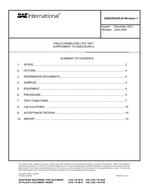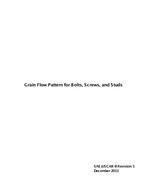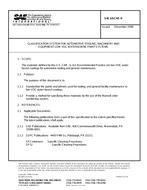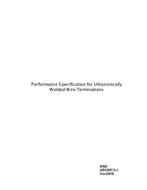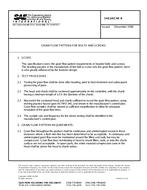Original price was: $81.00.$40.50Current price is: $40.50.
FIELD CORRELATED LIFE TEST SUPPLEMENT TO SAE/USCAR-2
standard by SAE International, 06/23/2004
Description
1.1 This life test for underhood/passenger/trunk connector systems may be used in place of Section 5.9.6, Connection System Electrical Table of SAE/USCAR-2. All other requirements of SAE/USCAR-2 remain applicable even when this test is used. Refer to SAE/USCAR-2 and Connector/Terminal Supplier for appropriate power rating and current cycle Testing.
1.2 When this life test is used in place of para. 5.9.6 of USCAR-2, complete Para 5.6.1- Sequence N (Thermal Shock) of SAE/USCAR-2 in it’s entirety in order to demonstrate capability to withstand the 10-cycle service (mate/un-mate) requirement.
1.3 This test specification details the procedure for testing the performance of electrical connections to a test sequence (FCLT – Field Correlated Life Test) that has been correlated to automotive vehicle conditions. The correlation applies to crimps and interfaces used in automotive applications and has been established with thousands of samples and millions of product and vehicle environmental measurements. The testing is performed with mated connector assemblies. In general, testing of connections at two base temperatures, 85°C and 125°C, through two cycles of the FCLT has been shown to correlate to at least 150,000 miles (240,000 kilometers). See Reference Documentation section for questions regarding correlation issues.
1.4 This test shall be performed a minimum of two times using separate sample sets, once at a base temperature of 85oC and once at a base temperature of 125oC. The base temperature is the temperature to be used in the thermal aging conditioning steps and as the upper temperature in thermal shock conditioning steps. (Both temperatures must be tested regardless of intended USCAR temperature or sealing class, except when 85°C testing is waived per paragraph 1.4.1)
1.4.1 The 85°C test is included in USCAR 20 because some crimps perform worse at 85°C than at 125°C. In those cases where it has been demonstrated that the phenomenon does not exist for that design type, 85°C testing for similar design types can be waived for future testing of other connector assembly combinations.
Product Details
- Published:
- 06/23/2004
- File Size:
- 1 file , 210 KB
